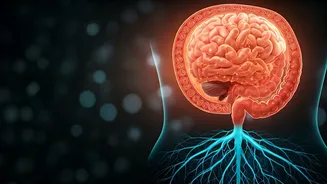The Gut-Brain Axis
The gut-brain axis is a two-way communication pathway connecting the gut and the brain. It's like a superhighway of information, where signals are constantly
exchanged. This intricate system uses various methods, including the vagus nerve, immune cells, and hormones, to transmit information. This communication impacts mood, behavior, and cognitive functions. Disruptions in the gut's balance can affect mental well-being. This complex interplay highlights the importance of maintaining a healthy gut to support overall mental health. A balanced gut microbiome is associated with reduced anxiety and improved mood. Maintaining this balance is crucial for mental clarity and emotional stability.
Microbiome's Impact
The gut microbiome, consisting of trillions of bacteria, viruses, and fungi, plays a vital role in influencing our mental well-being. These microorganisms produce neurotransmitters, such as serotonin and dopamine, which are key in regulating mood and emotions. When the microbiome is imbalanced, also known as dysbiosis, it can trigger inflammation and disrupt the production of these essential neurotransmitters. This imbalance is also often linked to mental health issues like depression and anxiety. A diverse and thriving gut microbiome helps promote a healthy brain environment. Dietary choices play a huge role in maintaining the balance of the gut microbiome, with foods high in prebiotics and probiotics being beneficial.
Diet and Mental Health
What we eat has a huge impact on both our gut health and our mental health. Diets rich in processed foods, sugar, and unhealthy fats can lead to inflammation and disrupt the gut microbiome. However, a diet emphasizing whole foods, fiber, and fermented foods can help foster a healthy gut. Fiber-rich foods like fruits, vegetables, and whole grains feed the beneficial bacteria in the gut, thereby supporting a balanced microbiome. Fermented foods, such as yogurt, kimchi, and kefir, introduce probiotics, which can improve gut health. Integrating these foods into a regular diet can, over time, improve both mental and physical health. Paying close attention to nutritional choices can be a proactive way to maintain better mental wellness.
Lifestyle Considerations
Besides nutrition, certain lifestyle factors impact gut health and, subsequently, mental well-being. Regular physical exercise has been proven to benefit gut health by enhancing microbial diversity and reducing inflammation. Consistent sleep patterns are also crucial. Insufficient or inconsistent sleep can disrupt the gut microbiome, leading to stress and mood swings. Managing stress through practices like meditation, yoga, or deep breathing can also help maintain a balanced gut and promote mental wellness. The combination of a balanced diet, regular exercise, adequate sleep, and effective stress management techniques can significantly support both gut health and mental well-being. These lifestyle changes provide a comprehensive approach to fostering a healthy gut-brain axis.
Seeking Professional Advice
While diet and lifestyle changes can greatly improve gut and mental health, it’s important to know when to seek professional advice. If experiencing persistent mental health symptoms like depression, anxiety, or other mood disorders, consulting with a mental health professional is crucial. A healthcare provider can assess the situation and offer tailored advice, which might include therapy, medication, or other interventions. Additionally, consulting with a gastroenterologist or registered dietitian can help evaluate and manage gut health issues that may be contributing to mental health problems. Together, these healthcare professionals can work collaboratively to provide complete support for overall well-being. Early intervention can greatly improve mental health outcomes.

















